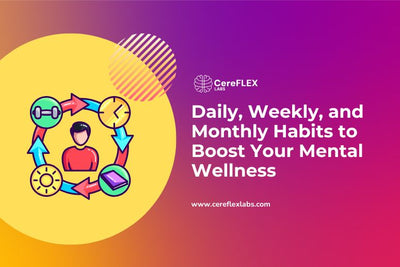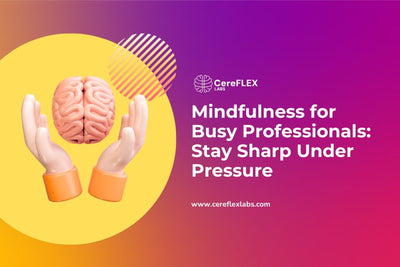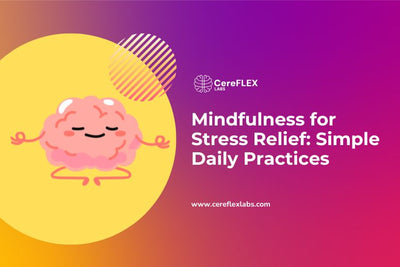Have you ever walked into a room and forgotten why you went there? Or struggled to keep up with a fast-paced conversation, feeling like your thoughts are slipping away? You’re not alone.
Maintaining mental clarity and strong memory can be challenging in today’s information-packed world. But the good news is that there are proven ways to improve cognitive function. This guide explores powerful nootropics and lifestyle strategies designed to enhance working memory, boost focus, and sharpen your thinking every day.

What is working memory?
Working memory is the brain’s temporary storage system that helps us hold and process information while performing complex tasks like reasoning, learning, and decision-making. Unlike short-term memory, which retains information in its original form, working memory allows us to manipulate and apply that information in real time.
For example, recalling a list of numbers is a short-term memory task, but rearranging them in reverse order requires working memory. This function is essential for planning, problem-solving, and comprehension, making it a core part of executive function.
Why is working memory important?
Working memory allows us to store and process information temporarily, helping us stay focused and complete tasks efficiently. Without it, we struggle to retain and apply details—such as following instructions, solving problems, or recalling conversations.
It plays a key role in many aspects of daily life:
- For Professionals – Supports multitasking, decision-making, and managing complex projects.
- For Students – Enhances reading comprehension, note-taking, and test performance.
- For Older Adults – Helps maintain cognitive sharpness and reduces memory issues.
-
For Everyday Life – Aids in remembering conversations, following directions, and making calculations.
How Working Memory Declines
Working memory naturally weakens over time due to several factors:
- Aging – The brain processes and retains new information less efficiently.
- Chronic Stress – Elevated cortisol levels impair memory formation and recall.
- Poor Sleep – Inadequate rest disrupts memory consolidation and cognitive function.
- Unhealthy Diet – A lack of essential nutrients affects brain performance.
- Lack of Mental Stimulation – Without regular cognitive challenges, memory function declines.
Can you improve working memory?
Yes! Through nootropics, cognitive training, and lifestyle adjustments, you can strengthen working memory, enhance focus, and keep your mind sharp at any age.
Which nootropics may help improve working memory?
Many nootropics, also known as cognitive enhancement supplements, can enhance working memory and cognitive function. Below are four of the most researched and widely used options:

Lion’s Mane Mushrooms
Lion’s mane mushroom (Hericium erinaceus) is gaining recognition for its potential brain-boosting benefits. Research suggests it enhances memory and cognitive function by stimulating nerve growth factor (NGF) production through its compounds hericenones and erinacines.
One study on rats with ADHD-like symptoms found that lion’s mane may improve working memory and cognitive processing.1 Its anti-anxiety and antidepressant effects further support cognitive resilience, making it a potential option for individuals with memory-related challenges.
L-Tyrosine
L-Tyrosine is an amino acid that supports dopamine production, helping the brain stay sharp under stress.
A study on 20 participants tested the effects of 150 mg/kg of L-Tyrosine on working memory tasks. Results showed enhanced accuracy and reduced mental strain, particularly in high-pressure situations requiring divided attention and multitasking. While it didn’t significantly impact math or auditory tasks, it helped maintain cognitive performance in demanding conditions.2
Acetyl-L-carnitine
Acetyl-L-carnitine is a natural compound derived from L-carnitine, known for its role in energy metabolism and mitochondrial function.
Research indicates that supplementing with Acetyl-L-carnitine can enhance both episodic and working memory.3 While episodic memory helps recall past events, working memory supports real-time problem-solving and decision-making—making this nootropic valuable for maintaining cognitive function.
American Ginseng
American ginseng (Panax quinquefolius) is an adaptogen known to combat mental fatigue and enhance cognitive function.
A study on Cereboost™ (a standardized extract of American ginseng) found that doses of 100, 200, or 400 mg significantly improved working memory in healthy young adults. The 100 mg dose also enhanced reaction time and promoted relaxation, highlighting its potential as a natural cognitive enhancer.4
Lifestyle Strategies to Boost Working Memory
While nootropics can enhance brain function, daily habits play a crucial role in naturally improving working memory. Incorporating these science-backed strategies can help strengthen cognitive abilities, enhance focus, and support long-term memory retention.

Eat Memory-Boosting Foods
A nutrient-rich diet supports brain health, focus, and memory retention. Eating brain-friendly foods can improve cognitive performance and protect against memory decline.
Gut health is directly linked to brain function. Fiber-rich foods support healthy gut bacteria, which:
- Reduce inflammation to help prevent memory problems.
- Stabilize blood sugar levels, preventing focus-draining energy crashes.
- Aid neurotransmitter production, essential for learning and recall.
Best high-fiber foods for your brain include:
- Whole grains (like oats, quinoa, brown rice)
- Legumes (such as lentils, chickpeas, black beans)
- Vegetables (like broccoli, spinach, carrots)
- Fruits (such as apples, berries, oranges)
- Nuts and seeds (like chia seeds, flaxseeds, almonds)
Other brain-boosting nutrients to consider include:
✔ Antioxidants – Found in berries, dark chocolate, and green tea, they protect brain cells from oxidative stress.
✔ Protein Sources – Essential for neurotransmitter production, found in eggs, lean meats, tofu, and fish.
✔ Hydration – Aim for at least 2 liters of water daily to maintain focus and memory.
Exercise for a Healthy Brain
Regular physical activity enhances cognition and strengthens working memory. Activities that engage both the body and mind, such as dancing or using the nondominant hand for tasks, promote neuroplasticity and improve cognitive flexibility.
Engaging in skill-building exercises like learning a new language, playing a musical instrument, or practicing strategic games such as chess challenges the brain and strengthens memory retention.
Creative outlets, including painting and reading, further support concentration and mental clarity.
Get Quality Sleep to Recharge Your Brain
A well-rested brain processes and retains information more effectively. Sleep plays a critical role in consolidating memories and organizing thoughts, making it easier to retrieve stored information later.
Deep sleep is particularly important for this process, and getting at least seven hours of sleep each night ensures optimal cognitive function. Without sufficient rest, focus and memory recall decline, affecting both daily tasks and long-term cognitive health.
Try Mindfulness Activities and Meditation
Mindfulness and meditation have been shown to improve working memory, lower stress, and enhance attention. Studies on mindfulness for memory indicate that mindfulness practices can increase attention span, enhance recall, and reduce cortisol levels, which helps prevent stress-induced memory problems.
Setting aside just 10–15 minutes daily for meditation or mindful breathing can significantly improve concentration and cognitive resilience.
Conclusion
Enhancing working memory is not just about short-term gains—it is a long-term investment in brain health. By integrating science-backed nootropics, healthy habits, and a nutrient-rich diet, you can significantly improve cognitive function, focus, and mental clarity. Combining these strategies with best brain-boosting supplements can further support optimal brain performance.
For those seeking a comprehensive solution, CereFlex Labs’ AM/PM Protocol provide targeted support throughout the day. The AM Brain Morning Formula delivers key nutrients to enhance memory and focus, while the PM Cognitive Support Formula promotes brain cell protection, circulation, and antioxidant support for long-term cognitive health.
Why Choose CereFlex Labs?
CereFlex Labs offers:
✅ Proven support for memory, mental clarity, and cognitive performance.
✅ A complete AM/PM system for sustained brain health.
✅ High-quality ingredients tailored for professionals, athletes, and anyone committed to cognitive wellness.
Upgrade your brain health today—explore the AM/PM Protocol from CereFlex Labs and take the next step in enhancing your cognitive potential.






